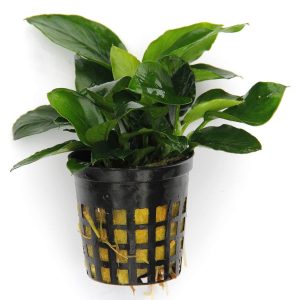Common Name: Anubias Nana Thick Leaf
Anubias Nana “Thick Leaf” is a less common variation of Anubias that make a handsome foreground accent. The plant is short with small, dark green, rounded wavy leaves. These plants are hardy and will accept a wide range of water parameters, making them perfect for beginners to the hobby. This plant can be grown either submersed or emersed, and works very well in bare-bottomed tanks. Anubias Nana “Thick Leaf” work very well with a variety of tank mates, and can survive even the most active and aggressive fish species
Anubias Nana “Thick Leaf” plants prefer a tank with good water circulation. Since they are slow growing they are prone to algae, especially under high light. These plants prefer low to moderate lighting. They can survive without CO2 injection, but will grow faster and larger with it.
The rhizomes will attach to a rock, piece of driftwood, or other tank decoration, but they can also float or be planted. You can tie the plant down with thread or fishing line to encourage it to root in a specific spot. Anubias Nana “Thick Leaf” propagates through its rhizome system. If the plant is healthy it should produce side shoots from its rhizome that you can separate and then allow to root in your tank. You can tie down the rhizome or let it float. Eventually it will sprout into another Anubias plant.
Notes:
- Anubias are strong plants that can thrive in a variety of environments.
- These epiphytes can be planted above the substrate or attached to hardscape.
- Burying the rhizome, will cause the plant to melt and die.
- Do not make drastic changes to the aquarium. Unstable parameters will result in melt and rotting of the aquarium plant.
- Please be sure to remove this plant from its pot. For instructions on how to properly prep aquarium plants
- CO2 injection and quality aquarium soil will yield better growth.
- Please research appropriately to ensure your plant thrives.
Family Name: Araceae
Origin: West Africa
Height: 1.5-4”
pH: 5.0-9.0
Care: Easy
Light: Low to medium
Co2: Not necessary but recommended
Propagation: Rhizome division
Growth rate: Slow












Reviews
There are no reviews yet.